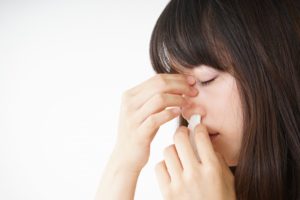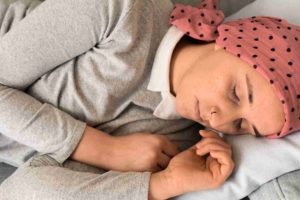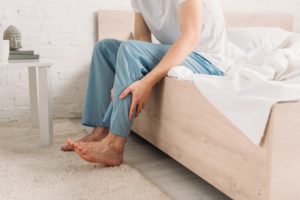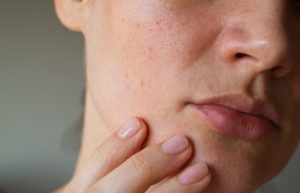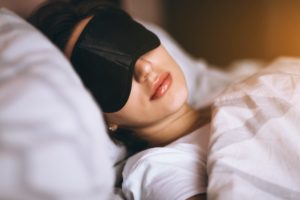When you buy through our links, we may earn a commission. Products or services may be offered by an affiliated entity. Learn more.
Thyroid Issues and Sleep
The thyroid is a small, butterfly-shaped gland located at the front of your neck. It produces two hormones, thyroxine and triiodothyronine, which regulate how the body uses energy. These hormones affect most organs and are vital to a wide range of physiological processes, such as breathing and heart rate, digestion, and body temperature.
Too many or not enough of these hormones can have adverse effects, so balanced thyroid activity is needed to maintain proper health. Thyroid issues can lead to sleep problems, as well. Conversely, thyroid conditions like hypothyroidism (underactive) and hyperthyroidism (overactive) are considered risk factors for certain sleep disorders.
What Causes Thyroid Disease?
Our bodies operate on a 24-hour cycle known as circadian rhythm, which is regulated by the master circadian clock located in a part of the brain called the suprachiasmatic nucleus (SCN) located in the hypothalamus.
The SCN releases different hormones that help maintain balance in the body and control different bodily functions, including your sleep-wake cycle. One of these hormones, thyrotropin, stimulates the thyroid to trigger the release of thyroid hormones. If the thyroid is overactive or underactive, this can interfere with thyrotropin production and your overall circadian rhythm.
Looking to improve your sleep? Try upgrading your mattress.
The condition known as hypothyroidism, or underactive thyroid, occurs when the thyroid does not produce enough hormones. According to current U.S. estimates, 1 in 20 people aged 12 and older have hypothyroidism. These patients are often treated with artificial thyroid hormones.
Hyperthyroidism, or overactive thyroid, affects about 1 in 100 people in the U.S. This condition arises when the thyroid produces an excessive amount of hormones. Patients with hyperthyroidism are often prescribed medications that lower their thyroid hormone levels.
For some people with thyroid issues, an underlying autoimmune disorder is at least partly to blame. In these instances, the immune system will mistake the body’s cells for harmful agents and attack them. Conditions like Graves’ disease can cause hyperthyroidism, whereas other diseases like Hashimoto’s disease can cause hypothyroidism. Type 1 diabetes is also considered a risk factor for hypothyroidism and hyperthyroidism.
Pregnancy has also been linked to thyroid problems, even in women who do not have a history of thyroid disease. Doctors will routinely monitor thyroid hormone levels to ensure good health for both the mother and her child. Some women experience overactive or underactive thyroid issues for up to a year after they give birth. Women with pre-existing thyroid problems are urged to treat their condition before getting pregnant.
Lastly, iodine intake can play a role in thyroid health. The thyroid gland uses iodine to produce hormones, so an inadequate or excessive amount of iodine in your diet can contribute to thyroid disease.
Can Your Thyroid Cause Sleep Problems?
Thyroid imbalances have been linked to sleep problems. Hyperthyroidism (overactive) can cause difficulty sleeping due to arousals from nervousness or irritability, as well as muscle weakness and constant feelings of tiredness. An overactive thyroid may also lead to night sweats and frequent urges to urinate, both of which can disrupt sleep.
People with hypothyroidism (underactive), on the other hand, often experience trouble tolerating cold at night and joint or muscle pain that disrupts sleep. Some studies have linked an underactive thyroid to poor quality sleep, longer sleep onset – or the time it takes to fall asleep – and shorter sleep duration during the night. Younger people, individuals with a relatively low body mass index, and women are all considered at higher risk of developing sleep problems due to hypothyroidism.
Hypothyroidism can also cause hypersomnia, or the irrepressible need to sleep or lapses into sleep that occur on a daily basis. Hypersomnia can occur due to an underlying medical disorder, and hypothyroidism is considered the leading cause of hypersomnia due to a disorder in the endocrine system. Additionally, untreated hypothyroidism can be mistaken for sleep-related hypoventilation, or excessively slow or shallow breathing that occurs primarily during sleep.
Thyroid disease may be a predisposing factor for restless legs syndrome (RLS). People with this disorder feel uncomfortable or unpleasant sensations in their legs while the body is at rest. In most cases, RLS symptoms often occur in the evening or around sleep onset. Because the disorder is so disruptive, RLS can lead to significant sleep loss and daytime impairments. While cases are somewhat rare, an overactive thyroid is also considered a predisposing factor for night terrors, a type of parasomnia sleep disorder characterized by sudden, terrified outbursts during the night.
Sleep habits may play a role in your susceptibility to thyroid disease. One study found that people who sleep fewer than seven hours per day are at greater risk of developing hyperthyroidism, while sleeping more than eight hours per day may increase the risk of both overactive and underactive thyroid function. Additionally, optimal sleep is believed to support a healthy immune system and people with weaker immune systems are at higher risk of developing thyroid dysfunction.
When to See a Doctor
Hypothyroidism develops slowly, so many people won’t notice their symptoms for years. It also shares symptoms with a wide range of other medical conditions, so your doctor will likely order additional testing. The same is true of hyperthyroidism and most diagnoses for an overactive thyroid also entail multiple blood tests. For many older patients, hyperthyroidism can present differently and may be mistaken for depression or dementia because it can cause similar symptoms such as loss of appetite and social withdrawals.
These additional blood tests may evaluate your thyroxine, triiodothyronine, and thyrotropin counts to determine whether your thyroid is overactive or underactive. People with hypothyroidism may be prescribed levothyroxine, an artificial hormone intended to boost your thyroid function, and tested six to eight weeks after they begin taking the medication to see if their counts have improved. If hyperthyroidism is suspected, the patient may be prescribed methimazole or another type of anti-thyroid medication.
Thyroid testing is often ordered for pregnant women due to their higher risk of developing thyroid disease. These tests may also be suggested for people seeking fertility treatment, as both hypothyroidism and hyperthyroidism can lead to difficulty conceiving.
If you notice an irregular lump or swelling on the side of your throat, you may want to make an appointment with your doctor – this may be the first sign of thyroid cancer, a condition that roughly 47,000 adults are diagnosed with each year. Other symptoms of thyroid cancer include trouble breathing or swallowing, or an unusually hoarse voice. Thyroid cancer can originate due to genetically inherited conditions, and exposure to radiation – especially as a child – may also increase your risk.
Tips for Better Sleep With Thyroid Issues
People with thyroid disease who experience sleep loss or disturbances may find relief by taking certain measures.
For many, finding the right bedroom temperature is key. Many experts agree that 65 degrees Fahrenheit (18.3 degrees Celsius) is the optimal sleep temperature for most people. However, those with thyroid disease may feel differently, as hyperthyroidism can cause night sweats and hypothyroidism can decrease your tolerance to the cold. The range of 65-68 degrees Fahrenheit is generally considered reasonable, but you may find your preferred temperature falls outside this range if you live with thyroid disease.
Practicing good sleep hygiene can also improve your sleep quality whether or not you have a thyroid condition. Sleep hygiene refers to practices and habits that promote consistent, uninterrupted and restorative sleep. These include going to bed and waking up at the same times (including on the weekends), avoiding electronic devices for up to an hour before bed, and winding down in the evening with soft music, light stretching, and other relaxing activities.
A healthy diet is also crucial for sleep hygiene. Heavy meals leading up to bedtime can be disruptive to sleep, so it’s better to opt for light snacks instead. People with thyroid issues should pay particular attention to their iodine intake, as too much or too little iodine in one’s diet can affect thyroid activity. You may also want to avoid caffeine and alcohol in the hours before bed, as both of these substances can disrupt sleep.

Still have questions? Ask our community!
Join our Sleep Care Community — a trusted hub of sleep health professionals, product specialists, and people just like you. Whether you need expert sleep advice for your insomnia or you’re searching for the perfect mattress, we’ve got you covered. Get personalized guidance from the experts who know sleep best.
References
7 Sources
-
Ikegami, K., Refetoff, S., Van Cauter, E., & Yoshimura, T. (2019). Interconnection between circadian clocks and thyroid function. Nature Reviews Endocrinology, 15(10), 590–600.
https://www.ncbi.nlm.nih.gov/pmc/articles/PMC7288350/ -
National Institute of Diabetes and Digestive and Kidney Diseases. (2016, August). Hypothyroidism (Underactive Thyroid).
https://www.niddk.nih.gov/health-information/endocrine-diseases/hypothyroidism -
National Institute of Diabetes and Digestive and Kidney Diseases. (2016, August). Hyperthyroidism (Overactive Thyroid).
https://www.niddk.nih.gov/health-information/endocrine-diseases/hyperthyroidism -
United Kingdom National Health Service. (2019, September 24). Symptoms: Overactive Thyroid (Hyperthyroidism).
https://www.nhs.uk/conditions/overactive-thyroid-hyperthyroidism/symptoms/ -
Song, L., Lei, J., Jiang, K., Lei, Y., Tang, Y., Zhu, J., Li, Z., & Tang, H. (2019). The Association Between Subclinical Hypothyroidism and Sleep Quality: A Population-Based Study. Risk Management and Healthcare Policy, 12, 369–374.
https://www.ncbi.nlm.nih.gov/pmc/articles/PMC6927586/ -
Kim, W., Lee, J., Ha, J., Jo, K., Lim, D., Lee, J., Chang, S., Kang, M., & Kim, M. (2010). Association between Sleep Duration and Subclinical Thyroid Dysfunction Based on Nationally Representative Data. Journal of Clinical Medicine, 8(11).
https://www.ncbi.nlm.nih.gov/pmc/articles/PMC6912782/ -
American Cancer Society. (2024, August 23). Signs and Symptoms of Thyroid Cancer
https://www.cancer.org/cancer/types/thyroid-cancer/detection-diagnosis-staging/signs-symptoms.html


























